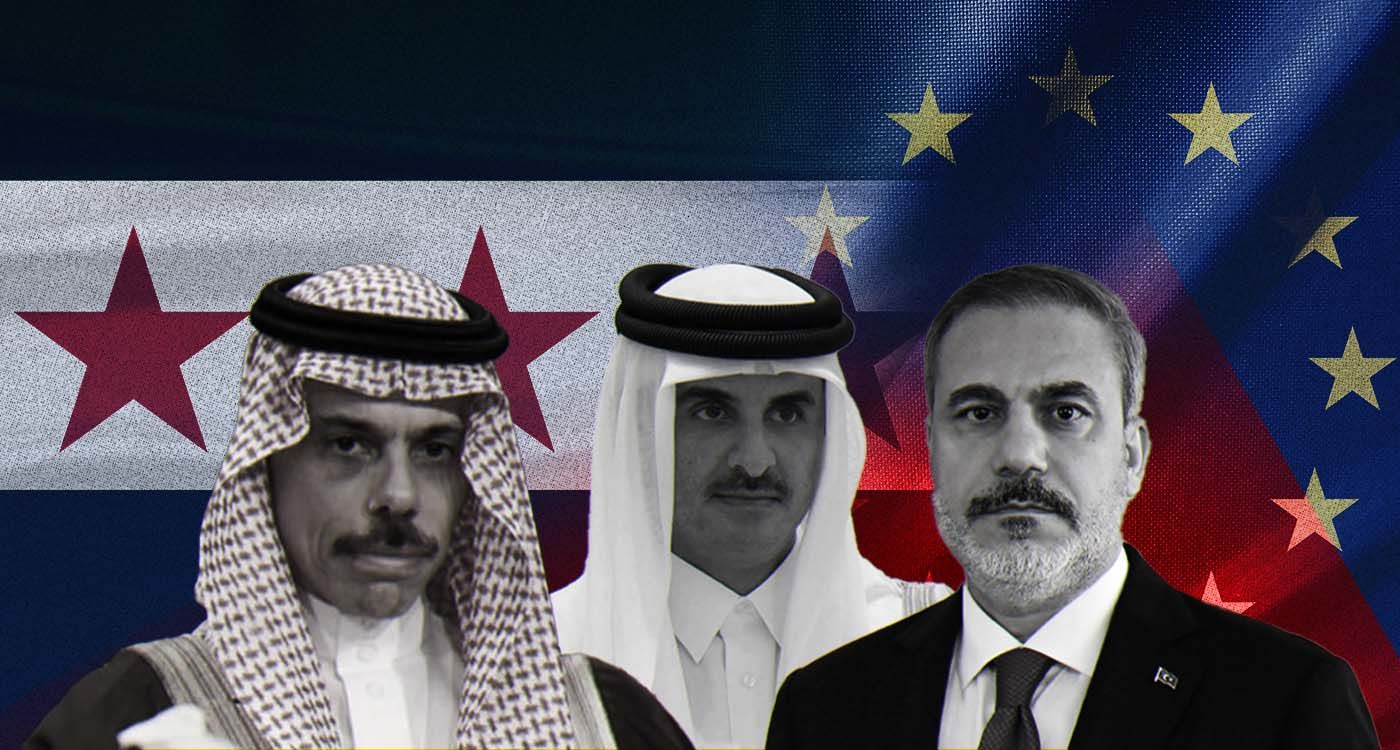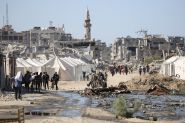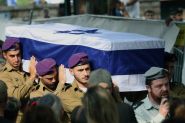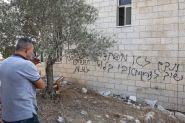- Home
- Middle East
- Explaining the Diplomatic Roller-Coaster in Damascus

The diplomatic roller-coaster in Syria’s capital since the fall of Bashar al-Assad’s regime suggests that a strategic shift is underway. This is all the more significant as the Prince of Qatar, Sheikh Tamim bin Hamad Al-Thani, made an official visit to Damascus on Thursday, where he was received by the interim Syrian president, Ahmad al-Sharaa. He is the first head of state to visit Syria since the ousting of the dictator, after 13 years of estrangement between Doha and Damascus. During his visit to the Syrian capital two weeks ago, the Qatari Prime Minister committed to supporting the reconstruction of Syria’s infrastructure, devastated by nearly 14 years of civil war.
Qatar was preceded by Russia, which sent two senior officials on Wednesday who met with leaders of the new regime. This was the first such visit since the fall of the Syrian dictator, an ally of the Kremlin, in December. Moscow, which has significantly reduced its military presence in Syria in recent years, prioritizing the conflict in Ukraine, wants to maintain its base at Hmeimim after evacuating its base in Tartus following Assad’s fall.
Meanwhile, Saudi Arabia's Foreign Minister, Faisal bin Farhan, met with the new Syrian leader last Friday. Sharaa expressed his wish for "the kingdom to open a new chapter in its relationship with Syria," hoping for "its help in rebuilding the war-devastated country."
The European Commissioner for Humanitarian Aid, Hadja Lahbib, who visited Damascus on January 17, told reporters that she "hoped to see an inclusive government that integrates the full diversity of Syrian society." For the same reason, French Foreign Minister Jean-Noël Barrot and his German counterpart Annalena Baerbock met with the new Syrian leader on January 3. On Monday, the 27 member states of the European Union agreed on a "roadmap" aimed at gradually easing the sanctions imposed under the previous regime. The Europeans also want to prevent migration flows to their territories.
Another key player in Syria, which has in some ways orchestrated the fall of the regime, is Turkey. Ankara followed suit by sending its Foreign Minister Hakan Fidan on December 22, while the head of Turkish intelligence, Ibrahim Kalin, had visited the Syrian capital just four days after the rebels took over power. Ankara insists primarily on resolving the Kurdish issue.
For his part, caretaker Lebanese Prime Minister Najib Mikati was received on January 10 by the new Syrian leader. This was the first such visit since the start of the conflict in 2011. Lebanon is finally seeking a healthy cooperation with its Syrian neighbor, respecting the sovereignty of both nations. Lebanon mainly wants to control its borders and resolve the issue of the approximately 1.5 million war-displaced and migrant Syrians on its territory since the outbreak of the conflict in 2011.
Economic Aid and Sanctions
Contacted by This Is Beirut, David Rigoulet-Roze, a researcher specializing in the Middle East and affiliated with IRIS, emphasizes that these are "serious visits by interlocutors who will be important going forward" in the context of "a complex transition" underway in Syria, "particularly regarding the issue of lifting sanctions." "These visits are important because they provide a conditional endorsement of the new governance," Rigoulet-Roze adds.
According to Fabrice Balanche, a lecturer at Lyon II University and Syria expert, contacted by This Is Beirut, "economic aid to the new government, particularly from Gulf countries, for reconstruction, will be conditioned on the lifting of sanctions on HTS," the radical Islamist group Hay'at Tahrir al-Sham, which was under Sharaa’s military command. "This aid would remain limited to a few million dollars until Washington gives its green light," according to Balanche, who adds that "the lifting of sanctions on HTS would also be contingent on the withdrawal of Russian bases from Syria." "This could happen either by force, or more smoothly by the Russians themselves, or perhaps at the initiative of Sharaa, a pragmatist who would likely negotiate their discreet withdrawal," Balanche believes.
Among the basic conditions required by the international community for the lifting of sanctions are the formation of an inclusive government and respect for human rights. Indeed, the interim Syrian president has made several positive gestures. He promised on Thursday to hold a "national dialogue conference," expressing his desire to preserve "civil peace." However, these commitments need to be translated into action.
Furthermore, Rigoulet-Roze explains that there are two types of funding, each with different conditions. Emergency humanitarian funding, which would be provided after sanctions are eased—including by the United States—differs from funding for medium- and long-term reconstruction. The latter is subject to stricter conditions imposed by the West to influence Syria's future governance.
The Kurdish Issue
Regarding the Kurdish issue, which he specializes in, Balanche emphasizes that "neither Turkish President Recep Tayipp Erdogan nor Sharaa will accept the idea of a Kurdish state in Syria, led by individuals close to the PKK (Kurdistan Workers' Party)." He recalls in this context that "the Kurds in Iraq enjoy a status of autonomy that the Kurds in Syria aspire to. The peshmergas of the Kurdish Regional Government in Iraq are not integrated into the Iraqi army and manage their own local oil, etc." He also notes that "Turkey (though a member of NATO) has distanced itself from the United States in favor of closer ties with Russia due to Washington's continuous support for the Kurds, reliable allies it has depended on since 2014 to retake the Syrian cities of Raqqa and Deir ez-Zor from Daesh (ISIS)." Balanche adds, "US support for the Kurds was mainly aimed at preventing Assad from reclaiming the oil in these areas, and Iran and Russia from gaining full control."
Gulf Countries and Turkey Relations
Asked by This is Beirut, Riad Kahwaji, a security and defense analyst based in Dubai and director of the Middle East and Gulf Military Analysis Institute (Inegma), emphasizes that "it is in the interest of international and regional actors to see a stabilized Syria with significant economic opportunities." He explains that "the Saudis, by quickly taking the initiative, are trying to mobilize other Arab actors into their fold, such as the Emirates and the Egyptians, to limit the influence of the Turks, who are trying to assert themselves and fill the void left by the Iranian withdrawal from Syria."
Moreover, Gulf countries are not all aligned on the same policy toward Turkey. Balanche explains in his interview with This is Beirut that "Ankara is allied with Qatar in contrast to the UAE-Saudi axis."
The visit of the Prince of Qatar is not insignificant. According to Kahwaji, "The Qataris have a lot to gain from their return to Syria. They have a crucial role to play with the Turks." He added that "among the potential projects, there is talk of building a Qatari-Turkish gas pipeline that would supply Europe via Syria." However, the director of Inegma notes that "efforts are currently being made to lift sanctions on HTS," estimating that "the new government would move in this direction in the coming months."
At the same time, another actor is watching developments in Syria closely: Israel. The country’s Defense Minister Israel Katz announced on Tuesday that Israeli troops would remain "at the top of Mount Hermon and in the security zone for an indefinite period to ensure the security of the Golan Heights, the North, and all citizens of the State of Israel."
Read more




Comments